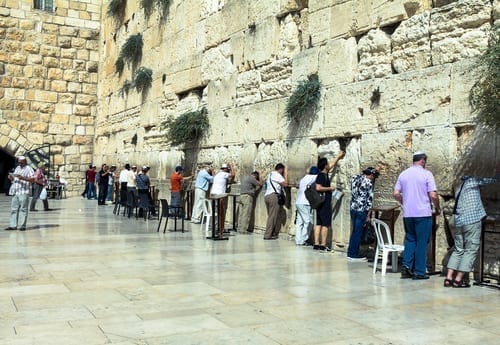
“Three times during the year shall all your male[s] appear directly before the Master, the L-rd, the G-d of Israel. When I drive out nations before you and I widen your border, no one will covet your land when you go to appear before the L-rd, your G-d, three times each year.” (Ex. 34:24)
The Torah’s Author commands all Jewish males: three times in the year, drop your business affairs, your fields, your vineyards, your stores, your homes, etc. everywhere in the country, and show your face in the Temple in Jerusalem on the holidays of Passover, Shavuot, and Sukkot.
Were a flesh and blood president to give such a command to his male citizens: drop everything and show up in the capital city three times a year, with the trip taking several days and the stay itself being a week long, he would justifiably arouse much rancor and even be accused of irresponsibility in forcing the entire populace to abandon their homes, warehouses, factories, stores and fields. The police and military would claim they don’t have sufficient resources to prevent the populace from being preyed upon by the thieves and criminals. And if the army was also commanded to leave their posts and show up without exception in the capital city, who would protect the borders?
The Torah’s Author was not deterred by any of this. He issued exactly such a command:
“Three times during the year shall all your male[s] appear directly before the Master, the L-rd, the G-d of Israel.”
He even announces His miraculous solution to all the above problems.
“No one will covet your land when you go to appear before the L-rd, your G-d, three times each year.” You can leave behind your business, home, fields and shops without a worry. No one will covet them and no one will cause you damage.
Only a supernatural ruler could give a command and a promise like this. This is a promise that would be put to test for hundreds of years during which the pilgrims travelled to Jerusalem.
Is there any human being who would dare to undertake such a commitment which would be proven worthless with the first break-in to a pilgrim’s house, or in an even worse case scenario, with the first invasion of the enemy’s armies while the whole populace was in Jerusalem? This bizarre command could bring the nation to war and the threat of destruction. If the enemy knew that the Jewish people had abandoned all its borders and cities for an entire week or more, and is celebrating in Jerusalem, there isn’t the slightest shadow of a doubt that this would be the perfect time to invade and conquer the land without opposition.
No one disputes the fact that the Jewish people observed the Torah’s commandments during the period of many of the kings of the Israelite kingdom, when the Temple was still in existence. If this promise was not fulfilled, why wasn’t there an outcry about it? Were they so naïve?
In fact, we have several interesting testimonies of what happened during that period. The Talmud Yerushalmi (Pe’ah 3:7) and Midrash Rabbah on Shir ha-Shirim (7:1) relates:
“It happened that one person forgot to lock the door of his house when he went on his pilgrimage. When he returned, he found a snake positioned inside the locks of his door.
“It also happened that someone forgot to coop his chickens up and went on his pilgrimage. When he returned, he found cats torn to pieces in front of them.
“Another case involved a person who forgot to put his bales of wheat away and went on his pilgrimage. When he returned, he found lions surrounding the wheat.
“Rabbi Pinchas said: Two wealthy brothers in Ashkelon had evil non-Jewish neighbors. They said to themselves, ‘When will these Jews go to Jerusalem so we can take everything they own?’ The day arrived and the Jews went on their pilgrimage. G-d sent angels who looked like them to enter and leave their homes. When the brothers returned from Jerusalem, they brought gifts for all their neighbors. The neighbors asked the brothers, ‘Where were you?’ They said, ‘In Jerusalem.’ ‘When did you go?’ ‘On such-and-such day.’ ‘And when did you return?’ ‘On such-and-such day.’ The neighbors said, ‘Blessed is the G-d of the Jews who didn’t forsake them and will not forsake them.’”
By the way, these facts are brought in the Midrash Rabbah on the verse discussing the friends of Shulamit who are speaking to her — which is a parable for the nations of the world speaking to the Jewish nation (Song of Songs 7:2): “How fair are your feet in sandals, O daughter of nobles!” This means that the gentile nations express their astonishment at the Jewish nation’s footsteps when they go on their pilgrimage to Jerusalem. They go securely, and tranquilly, because they know that everything which they left behind is guarded and protected.
Adapted from “Journey to the Truth” by Rabbi Zamir Cohen
